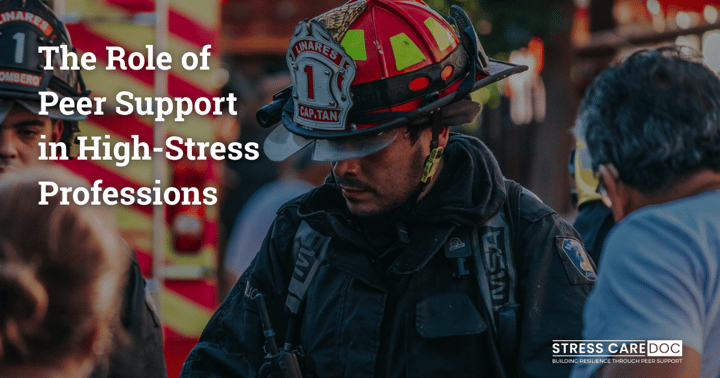Prepare for Retirement: 5 Steps to a Smooth Transition

Are you finding it hard to sleep thinking about what life will be like after your last shift? Do you worry about missing the rush of your job and the bond with your team? Retirement is coming, and it can be both exciting and scary. In this blog post, we’ll break down five simple steps to help you get ready for this big change, so you can not just get through retirement, but enjoy it. Your future self will thank you. Let me help you prepare for retirement.
Step 1: Plan for the Emotional Transition
Retirement is a huge step, especially for anyone in the helping professions. You've spent years dedicating your life to protecting, serving, and caring for others. You've been in high-pressure situations, formed strong bonds with your team, and experienced the adrenaline rush that comes with the job. As you approach retirement, you may feel a mix of exhilaration and dread.
It's normal to have questions and concerns about what will happen next. Retirement presents both challenges and opportunities. On the one hand, you'll have more free time to spend with your family, pursue hobbies, or travel if that's what you want to do. On the other hand, you might worry about losing the sense of purpose and camaraderie that came with your job.
To ease this transition, make plans to stay connected with your colleagues. Regular meetups like monthly dinners or breakfasts can help keep these important relationships strong. Consider community or volunteer work to give you a sense of purpose and fill the gap left by your job. You might find joy in coaching a youth sports team, volunteering at a local charity, or mentoring those just starting out in your chosen career.
Step 2: Make Sure You’re Financially Ready
Thinking about money for retirement can feel overwhelming, but it's crucial to make sure you're set up for a comfortable future. As you get closer to retirement, you need to have a clear picture of what your expenses will look like. This includes everyday costs like groceries and utilities, as well as bigger expenses like healthcare.
It's a good idea to look into these costs early and see what your options are. Talk to a financial advisor to help you understand your pension plan and other retirement benefits. They can help you create a budget based on your expected income and spending. Regularly checking in with your financial advisor ensures there are no surprises and that you're making the most of what you have.
Step 3: Look for New Interests and Activities
One of the questions I often ask is, "What do you do to relax?" or "What's a hobby or pastime you enjoy?" Many people answer, "I don't do anything but work." Retirement is the perfect time to explore new interests and hobbies. After years of a busy and demanding job, you finally have the freedom to do things you've always wanted to try.
Think about what you'd like to do. Maybe there's a hobby you've always wanted to pick up but never had the time for, like painting, gardening, or learning to play a musical instrument. If you miss the structure of having a job, consider part-time work or a new career path that excites you. Many retirees find fulfillment in teaching, consulting, or starting a small business. These activities not only keep you busy but also provide a sense of purpose and a little extra income.
Step 4: Prioritize Your Health and Well-being
After years of working in a demanding job, it's important to continue or maybe start building healthy habits to enjoy your retirement to the fullest. Regular exercise is super important. Find something you enjoy and make it a part of your daily routine. Taking care of your mental health is just as important. Incorporate stress management strategies into your daily routine. You might also consider talking to a therapist or a counselor, especially if you've been dealing with a lot of stress or trauma from your job.
If you have lingering physical health issues from your career, like back pain or injuries, now's the time to address them. Make regular appointments with your doctor and follow their advice on how to manage these issues. Staying on top of your health means you'll be able to enjoy your retirement more fully. Mental health issues such as PTSD or depression can be common among frontline professionals. If you're struggling with these, please don't hesitate to seek support. There are many resources available, from support groups to professional counseling.
Step 5: Redefine Your Identity and Purpose
One of the biggest challenges in retirement is figuring out who you are without your uniform or whatever helper hat you were wearing. For years, your identity has been tied up in your career. Now that you're retiring, it's time to embrace new roles and opportunities.
Start by thinking about what makes you tick. What are your passions and interests? Maybe you've always loved helping others, which is why you chose your career path in the first place. That doesn't have to stop just because you're retiring. You can still make a difference in other ways. Consider volunteering. Many organizations need dedicated people just like you. Whether it's helping out at a local food bank, working with veterans, or supporting disaster relief efforts, volunteering can give you a sense of purpose and keep you connected to your community.
Mentoring is another great option. With all your experience, you have a lot to offer those just starting out. Sharing your knowledge and helping them navigate their careers can be incredibly rewarding. It also helps keep you involved in the field you care about. Getting involved with first responder charities is a fantastic way to stay engaged. These organizations often help people with your background to help with fundraising, outreach, and support services.
Retirement is a new beginning, not an end. This is a chance to learn more about what you love, who you are, and finding a new sense of identity and purpose that can be just as satisfying as your old job. By taking on new roles and opportunities, you can keep that spirit alive in new ways.
There are many aspects of retirement that we could cover, like how it will affect your spouse or significant other, but we'll leave that for another time. I hope these steps help you prepare for a smooth and fulfilling transition to retirement.





